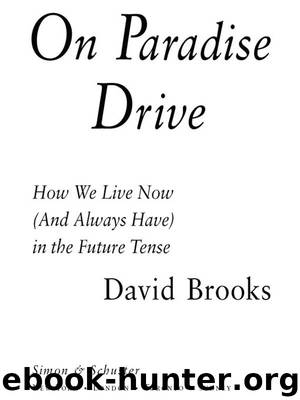On Paradise Drive by David Brooks

Author:David Brooks
Language: eng
Format: epub
Publisher: Simon & Schuster
Published: 2004-07-15T00:00:00+00:00
That’s good advice. But consider how arduous it is. “It is so easy to exist instead of live,” Quindlen said. You can rest assured that her listeners won’t renounce their career goals. Nor did she say they should. She was invited to address the crowd precisely because she herself has had such a phenomenally successful career. The destitute are rarely asked to give commencement addresses. Yet she is asking us to pile goodness on top of plenty, patience on top of hustle, tranquility on top of aspiration. When does Anna Quindlen expect us to sleep?
This is the culture of upwardly mobile childhood. And when you look at the frantic strivings of today’s young meritocrats, what you are seeing is the latest and maybe most fevered version of a long line of American strivings. It was the early settlers who established the code that life is a pilgrimage toward perfection. Jonathan Edwards told his flock never to be content with their virtues, never to feel satisfied. “The endeavor to make progress” in developing one’s character, he declared, “ought not to be attended to as a thing by the bye, but all Christians should make a business of it. They should look upon it as their daily business.”
Benjamin Franklin more or less invented the mode of childhood we see around us today. He was the original enterprising boy. “It was about this time,” he wrote somewhat ironically of his childhood ambitions, “that I conceived the bold and arduous project of arriving at moral perfection.” Franklin made a little scorecard of the thirteen virtues such as industry (“Lose no time. Be always employed at something useful”) and temperance (“Eat not to dullness. Drink not to elevation”). Then he gave himself daily performance reviews, marking his scorecard when he found himself guilty of imperfection.
One of the first outstanding American sociologists, Lester Ward, described “this all-pervading spirit of improvement” that marks American life. The constellation of American stock characters is dotted with young people on the make: the Horatio Algers, the Sammy Glicks, the ambitious immigrant kids, the gangsters trying to rise from obscurity to success, the politicians ascending from log cabin to White House. There is no real resting spot. “It is provided in the essence of things,” Walt Whitman acknowledged, “that from any fruition of success, no matter what, shall come forth something to make a greater struggle necessary.”
Take one of these young meritocratic kids raised on Mozart for Babies, tutored at age six, coached at age eight, honed and molded and improved and enlightened every day of his life, and imagine telling him at some point in middle adulthood that the ascent is over. All his dreams have been realized. There is no more need to exert himself. Do you think he’d be happy? Of course not. Inertia would reduce him to the gravest misery. He is bred to want more and better and deeper, to ceaselessly reform and improve himself. He has become, for better and worse, an American.
Download
This site does not store any files on its server. We only index and link to content provided by other sites. Please contact the content providers to delete copyright contents if any and email us, we'll remove relevant links or contents immediately.
Cecilia; Or, Memoirs of an Heiress — Volume 1 by Fanny Burney(32558)
The Great Music City by Andrea Baker(32018)
Cecilia; Or, Memoirs of an Heiress — Volume 2 by Fanny Burney(31956)
Cecilia; Or, Memoirs of an Heiress — Volume 3 by Fanny Burney(31941)
We're Going to Need More Wine by Gabrielle Union(19046)
All the Missing Girls by Megan Miranda(16026)
Pimp by Iceberg Slim(14506)
For the Love of Europe by Rick Steves(14121)
Bombshells: Glamour Girls of a Lifetime by Sullivan Steve(14075)
Talking to Strangers by Malcolm Gladwell(13370)
Norse Mythology by Gaiman Neil(13363)
Fifty Shades Freed by E L James(13240)
Mindhunter: Inside the FBI's Elite Serial Crime Unit by John E. Douglas & Mark Olshaker(9342)
Crazy Rich Asians by Kevin Kwan(9292)
The Lost Art of Listening by Michael P. Nichols(7506)
Enlightenment Now: The Case for Reason, Science, Humanism, and Progress by Steven Pinker(7313)
The Four Agreements by Don Miguel Ruiz(6765)
Bad Blood by John Carreyrou(6621)
Weapons of Math Destruction by Cathy O'Neil(6279)
